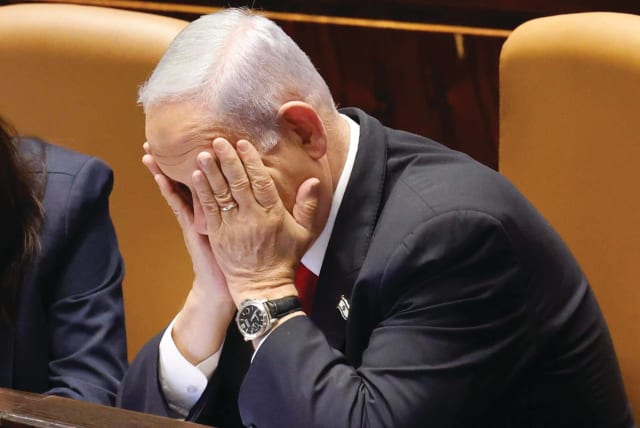Netanyahu is getting clumsier, and Israel is suffering for it - opinion

Several surveys showed that if elections were held today, Netanyahu and his extremist allies would be driven out of office.
It may not be the end but it could be the beginning of the end of the Benjamin Netanyahu era in Israeli politics.
Israel’s longest-serving prime minister seems to have lost his deft touch in maneuvering among competing factions but the clumsiness that marks his sixth term has plunged the country into the worst domestic crisis in its 75 years.
The catalyst has been his alliance with religious and nationalist extremists who are out of step with the majority of Israelis but brought enough votes to the table to put him back in power. At the heart of the crisis is a plan to overhaul the judicial system in a way that would destroy the independence of the nation’s judiciary and the balance of power it represents.
A well-kept secret
If Netanyahu had planned this assault on the judiciary and push towards autocracy, it was a very well-kept secret because he never mentioned it during his campaign or at his inauguration. Maybe he will offer the Kevin McCarthy defense: the extremists forced me to accept their demands in exchange for their votes to put me in office.
In what could be the most ominous outcome of this week’s maneuvering, Netanyahu agreed to let National Security Minister Itamar Ben-Gvir form his own police force, within the framework of a National Guard. Ben-Gvir, who has been convicted of incitement to racism and supporting a terrorist organization, has accused Israeli police of being too soft in responding to Palestinian violence. In his hands the National Guard can be counted on to change that.
Netanyahu’s reasons for agreeing to these demands are not hard to fathom. “His main agenda is to stay out of jail and no price is too high to pay, especially if we do the paying,” a former Israeli ambassador told me. “He is a weak man who speaks loudly and carries a small stick.”
Last week, the Knesset passed a law preventing the attorney-general from declaring Netanyahu unsuitable to remain in office at a time he is on trial for fraud, bribery and breach of trust and is under investigation on other possible criminal offenses. His new partners have offered to push through legislation to effectively drop the charges for which is now in the dock and give him future immunity.
He needs to keep the coalition together long enough to pass those measures; the rest, including – apparently – Israel’s status as a democracy is secondary.
After vowing to press full speed ahead to enact the highly contentious assault on the nation’s judiciary, Netanyahu was forced to back down when opponents brought the country to a virtual standstill on Monday.
The latest straw was his announcement on Sunday that he would be firing Defense Minister Yoav Gallant for having suggested the pause which Netanyahu ultimately agreed to the next day. Gallant had warned that the unrest stirred up by the judicial overhaul was a threat to national security.
Millions of Israelis have been protesting the legislation over the past dozen weeks. One of the architects of the plan, Simcha Rothman, chairman of the Knesset Constitution, Law and Justice Committee, said surrendering to demands for a pause would mean an end of democracy.
Rescuing Israel's threatened democracy
ON THE contrary, it could rescue Israel’s threatened democracy. Netanyahu’s rigid refusal to delay much less compromise until faced with broad national uprising could make this an inflection point that will bring down the most extreme right-wing government in Israel’s history.
The protesters crossed the political spectrum from center-right to Left. In a last-minute effort to prevent a pause, Ben-Gvir and Finance Minister Bezalel Smotrich, leaders of the extremist Otzma Yehudit and Religious Zionist Party respectively called out their followers to mount counter demonstrations.
By the time the pair agreed to a pause, the nation was paralyzed. The Histadrut labor movement had called a general strike; airports and border crossings were shut down; businesses shuttered; schools and hospitals closed; families of fallen soldiers called for a boycott of upcoming Remembrance Day ceremonies; elite units of the military joined protesters and hundreds of military reservists threatened to refuse to sign up for duty.
The threat goes well beyond the nation’s borders. Israel’s global standing has been undermined by the far-right government’s plot to destroy independent judiciary.
US-Israel relations
President Joe Biden and leaders of Israel’s most important allies – Britain, France and Germany – personally warned Netanyahu they consider the overhaul a threat to democracy. The American president phoned Netanyahu to express his deep concern and tell him “democratic values... must remain a hallmark” of the relationship.
Also last week, Israeli Ambassador Michael Herzog was summoned to the State Department for an unusual reprimand expressing concern over Knesset’s partial repeal of the 2005 disengagement law. Netanyahu brushed it off.
A “source close to the prime minister” – which reporters say often means Netanyahu himself – told reporters during his trip to London last week that US-Israel relations “aren’t fraying, they remain stable and consistent.” That may come as a surprise to Biden, to US officials and many American Jewish leaders who privately say they are deeply troubled by the chaos now consuming the nation and threatening its democracy.
Israel’s relations with friendly Arab states, like Egypt, Jordan and United Arab Emirates, are also strained.
If Israel’s allies are worried about the chaos gripping the country, its enemies are rejoicing, which explains why the fired defense minister and his predecessor called the government’s assault on the independent judiciary a danger to Israel’s national security.
Defense officials have told the media that Israel’s deterrence is eroding at a time of escalating threats from Iran, Palestinian terror and Tehran smuggling advanced weapons through Syria to its proxies on Israel’s borders.
And if his effort to hold his government together includes ceding even more power to its extremists to deal with the Palestinians, the tinder box Netanyahu has created could erupt into a full-scale conflagration.
Several surveys taken this week by pollsters Right and Left showed that if elections were held today, Netanyahu and his extremist allies would be driven out of office, according to i24 News. That could signal a defeat for authoritarian rule and a victory for Israeli democracy.
The writer is a Washington-based journalist, a consultant, a lobbyist and a former American Israel Public Affairs Committee legislative director.
Jerusalem Post Store
`; document.getElementById("linkPremium").innerHTML = cont; var divWithLink = document.getElementById("premium-link"); if (divWithLink !== null && divWithLink !== 'undefined') { divWithLink.style.border = "solid 1px #cb0f3e"; divWithLink.style.textAlign = "center"; divWithLink.style.marginBottom = "15px"; divWithLink.style.marginTop = "15px"; divWithLink.style.width = "100%"; divWithLink.style.backgroundColor = "#122952"; divWithLink.style.color = "#ffffff"; divWithLink.style.lineHeight = "1.5"; } } (function (v, i) { });

